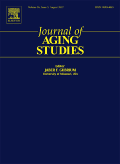
JOURNAL OF AGING STUDIES
Scope & Guideline
Exploring the Dynamics of Aging in Society
Introduction
Aims and Scopes
- Interdisciplinary Approaches to Aging:
The journal integrates insights from sociology, anthropology, cultural studies, and gerontology, providing a comprehensive understanding of aging as a complex social phenomenon. - Qualitative Research Methodologies:
Emphasizing qualitative methodologies, the journal prioritizes in-depth narratives, interviews, and ethnographies to capture the nuanced experiences of older adults. - Focus on Marginalized Groups:
The journal highlights the experiences of underrepresented populations, including LGBTQ+ individuals, migrants, and those living in poverty, bringing attention to their unique challenges and narratives. - Material and Non-Human Perspectives:
Incorporating material gerontology, the journal explores the role of objects, environments, and non-human entities in shaping the aging experience, thus expanding traditional gerontological discourse. - Cultural Representations of Aging:
The journal examines how aging is portrayed in media and literature, analyzing the implications of these representations on societal attitudes and policies towards older adults. - Social Justice and Aging:
A commitment to social justice is evident in the journal's focus on ageism, caregiving ethics, and the political agency of older adults, advocating for equitable treatment and representation.
Trending and Emerging
- Intersectionality in Aging:
There is a growing emphasis on intersectional approaches that consider how various identities—such as race, gender, sexuality, and socioeconomic status—interact to shape the aging experience. - Narratives of Aging and Identity:
The exploration of personal narratives, storytelling, and identity construction among older adults is gaining traction, reflecting a trend towards understanding how individuals make sense of their aging processes. - Aging and Environmental Contexts:
Research focusing on the relationship between aging and environmental factors, including urban design, community spaces, and materiality, is increasingly prevalent, highlighting the significance of context in aging experiences. - Mental Health and Well-Being:
There is a rising interest in the mental health challenges faced by older adults, particularly in relation to loneliness, dementia, and the impact of societal attitudes on their psychological well-being. - Creative and Artistic Expressions in Aging:
Emerging studies explore how artistic engagement and creative practices can enhance the quality of life for older adults, challenging traditional notions of aging as a decline. - Global Perspectives on Aging:
The journal is increasingly publishing research that examines aging in diverse cultural and geographic contexts, reflecting a trend towards a more global understanding of aging issues.
Declining or Waning
- Traditional Views of Successful Aging:
The concept of successful aging, which often emphasizes health and independence, has seen a decline as the journal shifts towards more nuanced discussions of aging that include failure, dependency, and the complexities of aging experiences. - Biological Determinism in Aging Studies:
There is a noticeable reduction in publications focused solely on biological or medical aspects of aging, indicating a move towards a more holistic understanding that encompasses social and cultural dimensions. - Aging and Technology Focus:
Earlier discussions centered heavily on technological interventions for aging populations are becoming less frequent, as the journal now emphasizes the ethical implications and social dynamics surrounding technology use. - Homogenized Aging Narratives:
The journal is moving away from one-size-fits-all narratives about aging, which often overlook individual and cultural differences, towards a more intersectional and diverse representation of aging experiences. - Policy-Oriented Research:
Research that strictly focuses on policy implications without engaging with the lived experiences of older adults is less prominent, reflecting a shift towards more experiential and narrative-driven analyses.
Similar Journals

JOURNAL OF GERONTOLOGICAL SOCIAL WORK
Transforming social work with evidence-based solutions.The JOURNAL OF GERONTOLOGICAL SOCIAL WORK, published by Routledge Journals, Taylor & Francis Ltd, serves as a pivotal platform in the multidisciplinary study of gerontology, specifically focusing on social work practices affecting older adults. Since its inception in 1979, the journal has cultivated a robust collection of scholarly articles that address critical issues in aging, incorporating diverse perspectives from nursing, social sciences, and social work disciplines. Currently, the journal holds esteemed rankings within various categories, including Q2 in Nursing (miscellaneous) and Q1 in Social Sciences (miscellaneous), showcasing its influence and relevance in the field. With its high Scopus ranking—#96 out of 604 in Social Sciences and #9 out of 45 in Nursing—this publication is essential for researchers and practitioners aiming to improve service delivery and practices surrounding elderly care. Though not offering open access, its contributions are nonetheless invaluable for fostering scholarly dialogue and advancing knowledge within gerontological social work. The journal's emphasis on evidence-based practice, innovative research methodologies, and policy implications makes it a critical resource for anyone committed to enhancing the lives of older populations.

Gerontology and Geriatric Medicine
Transforming elder care through high-quality research.Gerontology and Geriatric Medicine is a distinguished journal published by SAGE Publications Inc, focusing on the vital field of gerontology and geriatrics. With an impressive Q2 ranking in Geriatrics and Gerontology as of 2023, this journal serves as a crucial platform for disseminating high-quality research and innovation related to aging and elderly care. Since embracing an Open Access model in 2015, it has broadened its reach, enabling scholars, researchers, and practitioners worldwide to access valuable insights without barriers. The journal’s scope encompasses a variety of interdisciplinary studies that address the multifaceted aspects of geriatric medicine, making it an essential resource for anyone dedicated to advancing knowledge and practices in this critical domain. With its commitment to enhancing the understanding of aging populations, Gerontology and Geriatric Medicine is poised to contribute significantly to the ongoing discourse and research developments in the care for older adults.
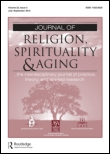
Journal of Religion Spirituality & Aging
Transforming Perspectives on Faith and LongevityThe Journal of Religion, Spirituality & Aging, published by Routledge Journals, Taylor & Francis Ltd, is a vital interdisciplinary platform that explores the intricate relationships between spirituality, religion, and the aging process. With an ISSN of 1552-8030 and an E-ISSN of 1552-8049, this journal critically addresses the evolving challenges and opportunities faced by older adults in the context of faith and spirituality. Covering a wide range of topics and methodologies, it has garnered a strong reputation in its field, achieving a Q1 ranking in Religious Studies and a Q3 ranking in Life-span and Life-course Studies for 2023. The journal serves as an essential resource for researchers, professionals, and students interested in gerontology, psychology, sociology, and related fields, fostering a deeper understanding of how spirituality can enhance the quality of life among older populations. While not an open-access journal, it continues to contribute significantly to the discourse on aging and spirituality through carefully curated scholarly articles, reviews, and studies.

ZEITSCHRIFT FUR GERONTOLOGIE UND GERIATRIE
Illuminating the path to improved elder care practices.ZEITSCHRIFT FUR GERONTOLOGIE UND GERIATRIE, published by SPRINGER HEIDELBERG, is an authoritative journal dedicated to advancing the field of geriatrics and gerontology. With its ISSN 0948-6704 and E-ISSN 1435-1269, this journal has been a significant source of scholarly articles since its inception in 1995, catering to researchers and practitioners amid the growing importance of ageing studies. While it currently holds a Q4 ranking in Geriatrics and Gerontology and a Q3 ranking in Gerontology and Social Sciences, its contribution spans vital topics related to health ethics and legal aspects—reflecting a comprehensive view of the challenges faced in elder care. Although it is not an open-access journal, its rigorous peer-review process ensures that the research published is of high quality and relevance. Based in Heidelberg, Germany, the journal aims to foster discourse and disseminate crucial research findings that impact the health of elderly populations, making it an essential resource for researchers, healthcare professionals, and students devoted to improving geriatric care and understanding the complexities associated with ageing.
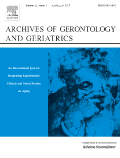
ARCHIVES OF GERONTOLOGY AND GERIATRICS
Shaping the future of geriatric practice through research.The Archives of Gerontology and Geriatrics, published by Elsevier Ireland Ltd, is a leading journal in the fields of Aging and Geriatrics and Gerontology. With an ISSN of 0167-4943 and an E-ISSN of 1872-6976, it has established itself as a crucial platform for disseminating high-quality research focused on the biological and psychosocial aspects of aging. The journal holds an impressive Q2 ranking in both Aging and Geriatrics and Gerontology, and a Q1 ranking in Gerontology and Health (Social Science) as of 2023, reflecting its significant impact in these disciplines. Additionally, the journal is ranked #33/371 in Social Sciences (Health) and #5/39 in Nursing (Gerontology) according to Scopus, showcasing its esteemed position in the academic community. Although currently not open access, the journal offers a wealth of research articles from 1982 to the upcoming 2025 that are vital for stakeholders including researchers, healthcare professionals, and students aiming to advance their understanding of aging processes and policies. Titles published within its pages contribute to shaping agendas in public health and gerontological practice, making it an essential resource for those involved in the study of the elderly population.
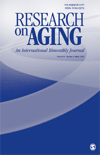
RESEARCH ON AGING
Exploring the multifaceted effects of aging on society and health.RESEARCH ON AGING is a renowned academic journal dedicated to advancing the knowledge and understanding of aging and its multifaceted effects on health, society, and psychology. Published by SAGE PUBLICATIONS INC, this journal has been a pivotal resource since its inception in 1979, disseminating cutting-edge research and insights that shape the field of gerontology. With a commendable impact factor and esteemed rankings in Geriatrics and Gerontology (Q2), Health (social science) (Q1), and Social Psychology (Q2), it positions itself at the forefront of ongoing dialogues in these critical areas. The journal appeals to a diverse audience, including researchers, healthcare professionals, and students, who seek to explore the complexities of aging. Though access is not available through Open Access, RESEARCH ON AGING continues to be an essential platform for impactful research and multidisciplinary discussion, making it an invaluable asset for anyone interested in the social and health-related dimensions of aging through to 2024 and beyond.

Journal of Cross-Cultural Gerontology
Connecting Cultures for a Deeper Understanding of AgingJournal of Cross-Cultural Gerontology, published by SPRINGER, is an influential academic journal that focuses on the complex interactions between culture and aging in a global context. Since its inception in 1986, this journal has committed to exploring the multifaceted aspects of gerontology through an interdisciplinary lens, making it a valuable resource for researchers, healthcare professionals, and students alike. The journal is ranked in the second quartile of both Geriatrics and Gerontology and Health (social science), reflecting its substantial contribution to the field and its commitment to high-quality research. With an impact factor that showcases its relevance within the scholarly community, the journal provides a platform for empirical studies, theoretical discussions, and critical reviews that address the needs and challenges of an aging population across diverse cultural settings. Although it does not currently offer open access, its robust indexing and reputation within the Scopus database—ranking #134 out of 371 in Social Sciences (Health) and #65 out of 116 in Medicine (Geriatrics)—underscore its impact and credibility in the field. By bridging cultural perspectives and gerontological research, the Journal of Cross-Cultural Gerontology stands as a pivotal resource for advancing knowledge and practices in aging-related studies.
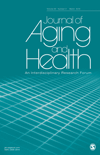
JOURNAL OF AGING AND HEALTH
Exploring the intersection of gerontology and well-being.The JOURNAL OF AGING AND HEALTH, published by SAGE PUBLICATIONS INC, is a preeminent peer-reviewed journal dedicated to advancing research in the field of gerontology and related disciplines. With an impressive impact factor and ranked Q1 across multiple categories including Community and Home Care, Geriatrics and Gerontology, and Health (Social Science), this journal has established itself as a vital resource for academics, clinicians, and policymakers alike. Spanning over three decades of publication from 1989 to 2024, it serves as a platform for innovative research and multifaceted discussions on aging, health, and the interplay of social factors influencing the elderly population. The journal's rigorous standards for publication ensure high-quality contributions that are impactful and relevant, making it an essential read for those dedicated to improving the health and quality of life for older adults. Although it is not an open-access journal, it provides comprehensive insights that are critical to understanding the complexities of aging in today's society.

INTERNATIONAL PSYCHOGERIATRICS
Fostering Excellence in Psychogeriatric ResearchINTERNATIONAL PSYCHOGERIATRICS, published by Cambridge University Press, stands as a premier journal in the realm of Psychology, Geriatrics, and Gerontology. Established in 1989 and continuing through 2024, this journal holds a distinguished position, evidenced by its 2023 quartile rankings of Q1 in Clinical Psychology, Geriatrics, and Gerontology, and Q2 in Psychiatry and Mental Health. With an impressive Scopus ranking—19th in Clinical Psychology and 3rd in Gerontology—the journal is dedicated to advancing the understanding of mental health in older adults, making it a crucial resource for researchers, healthcare professionals, and students alike. Although it does not offer open access, the journal ensures a broad dissemination of knowledge through subscriptions while maintaining high academic standards and rigor. With a focus on critical research articles, reviews, and clinical studies, INTERNATIONAL PSYCHOGERIATRICS continues to shape the dialogue around the complex interplay of aging and mental health.
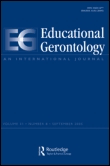
EDUCATIONAL GERONTOLOGY
Pioneering research for a wiser, more educated aging population.EDUCATIONAL GERONTOLOGY, published by Taylor & Francis Inc, is a leading academic journal dedicated to the study of education and aging. With an ISSN of 0360-1277 and an E-ISSN of 1521-0472, this journal has been an essential resource since its inception in 1976, continuing to provide invaluable insights until 2024. As an authoritative platform in the fields of Education and Gerontology, it ranks in the Q2 category for Education and Q3 in Geriatrics and Gerontology, reflecting its significant contribution to these domains. The journal is well-regarded for its rigorous peer-reviewed articles that explore innovative educational practices for older adults and address the challenges faced by this demographic. Researchers, professionals, and students alike can benefit from the multidisciplinary approaches and comprehensive research findings presented within its pages, making it a vital tool for advancing knowledge and practice in educational gerontology.